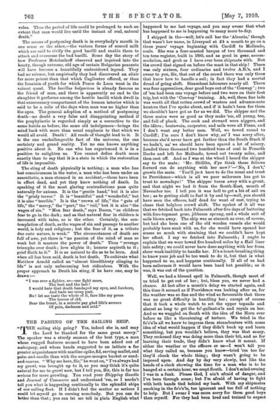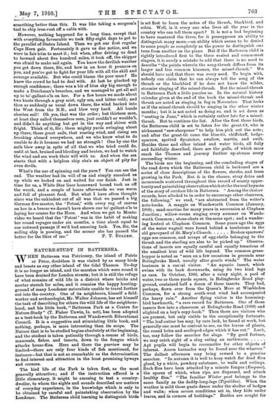THE PASSING OF THE SAILING SHIP. happened to me last
voyage, and you may swear that what has happened to me is happening to many more to-day.
I shipped in the—well, let's call her the 'Alcestis,' though that wasn't her name, in Liverpool at £4 a month to go on a three years' voyage beginning with Cardiff to Mollendo, coals. She was a four-masted barque of two thousand and ten tons register, built in 1895, and as good in gear, accom- modation, and grub as I have ever been shipmate with. But the crowd that signed on before the mast in that ship ! There was only sixteen, four ordinaries and twelve A.B.'s, and I swear to you, Sir, that out of the crowd there was only three that knew how to handle a sail; in fact they had a mortal dread of going aloft. Steamboat labourers nearly all. There was four apprentices, dear good boys out of the Conway '; two of 'em had been one voyage before and two were on their first trip, but with the Conway' training. Ah, well, them fine lads was worth all that rotten crowd of wasters and advance-note hunters that I've spoke about, and if it hadn't been for them we shouldn't have got as far as we did. The skipper and the three mates were as good as they make 'em, all young, too, and full of pluck. The cook and steward were niggers, and the idlers ; boatswain, carpenter, and sails were all Finns, and I don't want any better men. Well, we towed round to Cardiff; I'm sure I don't know why, an' I was sorry after, because she'd never have got farther than the South Stack if we hadn't, an' we should have been spared a lot of misery. Loaded three thousand two hundred tons of coal in Penarth Docks and left for Mollendo, towed out twenty miles, and then cast off. And as I was at the wheel I heard the skipper say to the mate : ' Mr. Shillito, d'ye think those fellows forrard can do anything with her now ? No, I don't,' growls the mate. ` You'll just have to do the usual and trust to Providence—which is all we poor sailormen has got to trust to nowadays ! ' The skipper turns away with a grunt, and that night we had it from the South-East, month of November too. I tell you it was hell to get a bit of sail on her ; as to getting aloft to furl it by and by—well, you should have seen the officers, half dead for want of rest, trying to chase that helpless crowd aloft. The upshot of it all was that we fetched back into Falmouth after five days of battering with fore-topmast gone, jibboom sprung, and a whole suit of sails blown away. The ship was as staunch as ever, of course, but had she been one of the old wooden vessels she would probably have sunk with us, for she would have opened her seams so much with straining that we couldn't have kept her afloat. I say we fetched into Falmouth ; I ought to explain that we were towed five hundred miles by a Hall liner into safety ; we could never have done anything with her from sheer weak inability to handle her. It's a heart-breaking thing to know your job and be too weak to do it, but that is what happened to us, and happens continually. If all of us had been sailormen it would have been hard but possible ; as it was, it was out of the question.
Well, we had a blessed spell in Falmouth, though most of us tried to get out of her; but, bless you, we never had a chance. At last after a month's delay we started again, and this time it seemed as if Providence was looking after us, for the weather was so fine and the wind so favourable that there was no great difficulty in handling her ; except of course that it took a whole watch to set the upper topsails and almost as long to get the to'-gallant-s'ls and royals on her. And so we waggled on South with the idea of the Horn ever before us like a threatening of torture. We tried in the fo'c's'le all we knew to impress them steamboaters with some idea of what would happen if they didn't buck up and learn something, but you wouldn't believe, they was that saucy. They reckoned they was doing more than their bit, and as for learning their trade, they didn't know what it meant. If either the weather or the officers or us—I won't tell you what they called us, because you know—tried 'em too far they'd chuck the whole thing ; they wasn't going to be imposed upon. And day by day very slowly, but like the hands of a clock showing the time for a man who is to bo hanged at a certain hour, we crept South. I don't mind owning I was in a funk. Please God, I ain't afraid of danger, and I've been through some ; but I'm afraid of having to fight with both hands tied behind my back. With my shipmates smoking in the fo'c's'le, too ignorant and too full of nothing to help. But I swear I was more sorry for them good boys than myself. For they had been bred and trained to expect
something better than this. It was like taking a surgeon's tool to chip iron-rust off a cable with.
However, nothing happened for a long time, except that with everything favourable we took fifty-eight days to get to the parallel of Staten Island. Then we got our first regular Cape Horn gale. Fortunately it gave us due notice, and we were in fair trim to meet it ; but when, after driving us dead to leeward about five hundred miles, it took off, the skipper was afraid to make sail again. You know the devilish weather you get down there, Sir, and how in an hour it pounces on you, and you've got to fight for your life with all the skill and courage available. But who could blame the poor man P He knew the crowd he had to deal with. At last he plucked np enough confidence ; there was a bit of blue sky big enough to make a Dutchman's breeches, and we managed to get all sail up to to'-gallant-s'ls on her. For a few hours we made about two knots through a grey mist, ugly sea, and bitter cold; and then as suddenly as usual down there, the wind backed into the West from the N.E., and blew very hard. All hands shorten sail! Oh yes, that was the order; but thirteen men, at least they called themselves men, just couldn't or wouldn't, and didn't do anything but get in the way and shiver with fright. Think of it, Sir; them mighty yards swinging about up there, those great sails, that roaring wind, and rising sea breaking aboard everywhere, and we who knew what to do unable to do it because we had no strength ! One by one the sails blew away in spite of all that we who tried could do, until at last, bruised and bleeding and beaten, we had to watch the wind and sea work their will with us. And when the sea starts that with a helpless ship she's an object of pity for even devils.
What's the use of spinning out the yarn P You can see the end. The weather had its will of us and simply smashed us up while we looked on and waited for our finish. Just in time for us, a White Star liner homeward bound took us off the wreck, and a couple of hours afterwards we was warm and full of pleasant food. But what I have often thought since was the unkindest cut of all was that we passed a big German five-master, the ' Potosi,' with every rag of canvas on her in a breeze we daren't have shown our to'-gallant-s'ls to laying her course for the Horn. And when we got to Monte- video we heard that the 'Potosi ' was in the habit of making her round voyages under six months, a time about equal to our outward passage if we'd had amazing luck. Yes, Sir, the sailing ship is passing, and the sooner she has passed the











































 Previous page
Previous page